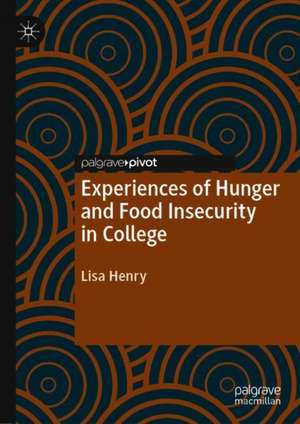Experiences of Hunger and Food Insecurity in College
Autor Lisa Henryen Limba Engleză Hardback – 20 noi 2019
Preț: 453.78 lei
Nou
Puncte Express: 681
Preț estimativ în valută:
86.86€ • 94.38$ • 73.01£
86.86€ • 94.38$ • 73.01£
Carte tipărită la comandă
Livrare economică 21 aprilie-05 mai
Preluare comenzi: 021 569.72.76
Specificații
ISBN-13: 9783030318178
ISBN-10: 3030318176
Pagini: 131
Ilustrații: XVII, 131 p. 18 illus. in color.
Dimensiuni: 148 x 210 mm
Greutate: 0.4 kg
Ediția:1st ed. 2020
Editura: Springer International Publishing
Colecția Palgrave Pivot
Locul publicării:Cham, Switzerland
ISBN-10: 3030318176
Pagini: 131
Ilustrații: XVII, 131 p. 18 illus. in color.
Dimensiuni: 148 x 210 mm
Greutate: 0.4 kg
Ediția:1st ed. 2020
Editura: Springer International Publishing
Colecția Palgrave Pivot
Locul publicării:Cham, Switzerland
Cuprins
1. Introduction.- 2. Meaning and Experience of Food Insecurity.- 3. Stigma and Shame.- 4. Physical Health, Mental Health, and Nutrition.- 5. Academic Success and Motivation.- 6. Solutions.- 7. Conclusions.
Recenzii
“These two very different books provide useful counterpoints on campus food insecurity, a growing phenomenon only made worse by the COVID-19 pandemic. … Together they provide both a balanced treatment of the subject and some remarkably interesting insights and strategies that other college communities can utilize.” (Mark B. Lapping, Journal of Agriculture, Food Systems, and Community Development, Vol. 11 (2), 2021-2022)
Notă biografică
Lisa Henry is Professor of Anthropology at the University of North Texas, USA. As an applied medical anthropologist, her research interests include food insecurity, globalization and health, indigenous healing systems, biomedicine and healthcare delivery, and anthropology in public health. She is Past-President of the National Association for the Practice of Anthropology (NAPA).
Textul de pe ultima copertă
“A poignant portrayal of what it means to be a college student today, this thoughtful and timely book illuminates the lived experiences of students who are struggling to get enough to eat and how they cope with this reality. It is a must-read for anyone who wants to better understand today’s college students and how we can better support them in their educational goals.”
—Katharine M. Broton, Assistant Professor of Educational Policy and Leadership Studies, University of Iowa, USA, and co-editor (with Clare L. Cady) of Food Insecurity on Campus: Action and Intervention (2020)
This volume explores the experience of hunger and food insecurity among college students at a large, public university in north Texas. Ninety-two clients of the campus food pantry volunteered to share their experiences through qualitative interviews, allowing the author to develop seven profiles of food insecurity, while at once exploring the impact of childhood food insecurity and various coping strategies. Students highlighted the issues of stigma and shame; the unwillingness to discuss food insecurity with their peers; the physical consequences of hunger and poor nutrition; the associations between mental health and nutrition; the academic sacrifices and motivations to finish their degree in the light of food insecurity; and the potential for raising awareness on campus through university engagement. Henry concludes the book with a discussion of solutions—existing solutions to alleviate food insecurity, student-led suggestions for additional resources, solutions in place at other universities that serve as potential models for similar campuses—and efforts to change federal policy.
—Katharine M. Broton, Assistant Professor of Educational Policy and Leadership Studies, University of Iowa, USA, and co-editor (with Clare L. Cady) of Food Insecurity on Campus: Action and Intervention (2020)
This volume explores the experience of hunger and food insecurity among college students at a large, public university in north Texas. Ninety-two clients of the campus food pantry volunteered to share their experiences through qualitative interviews, allowing the author to develop seven profiles of food insecurity, while at once exploring the impact of childhood food insecurity and various coping strategies. Students highlighted the issues of stigma and shame; the unwillingness to discuss food insecurity with their peers; the physical consequences of hunger and poor nutrition; the associations between mental health and nutrition; the academic sacrifices and motivations to finish their degree in the light of food insecurity; and the potential for raising awareness on campus through university engagement. Henry concludes the book with a discussion of solutions—existing solutions to alleviate food insecurity, student-led suggestions for additional resources, solutions in place at other universities that serve as potential models for similar campuses—and efforts to change federal policy.
Caracteristici
One of the first inductive, qualitative studies of the experience of food insecurity Covers a range of topics intersecting with food insecurity, from finances, academic success, childhood food insecurity, stigma and shame, secrecy, and other areas Suggests ways to engage the university in broader conversations about food insecurity and provides ideas for solutions that go beyond the food pantry
